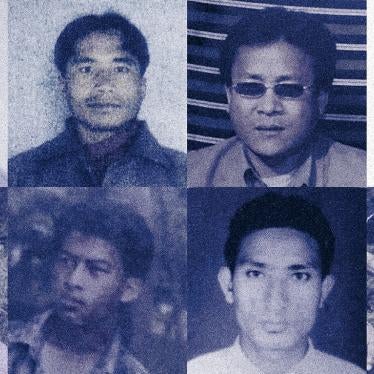(New York) - The Uzbek government should conduct a thorough and transparent investigation into the theft of human rights organization Ezgulik's computer hard drive, do everything possible to ensure its return, and prosecute those responsible, Human Rights Watch said today.
Ezgulik's Tashkent office was broken into during the weekend of May 22 and 23, 2010, and the hard drive was taken from the computer. The hard drive contained information about Ezgulik's activities and planned projects. Nothing else in the office was stolen. Ezgulik (Goodness) is one of two human rights organizations the government has allowed to register in Uzbekistan.
"The theft of Ezgulik's hard drive appears to be a politically motivated effort to interfere with Ezgulik's human rights work," said Holly Cartner, Europe and Central Asia director at Human Rights Watch. "If allowing the group to register means anything, then the government should do everything in its power to locate the hard drive and return it to Ezgulik."
An Ezgulik activist, Abdurakhmon Tashanov, told Human Rights Watch that when he arrived at the Ezgulik office this morning at around 10:30 a.m., the door to the office was sealed. The building watchman noticed that it was ajar during his rounds on Saturday evening and had sealed the door, but had not alerted Tashanov, saying he did not have his number.
Tashanov immediately reported the incident to the police, who later that day opened a criminal investigation into the theft under article 169 of the Uzbek Criminal Code.
The government accepted Ezgulik's registration in 2003, on the eve of the annual meeting of the European Bank for Reconstruction and Development, which took place in Tashkent. It has branches throughout Uzbekistan and reports on violations of human rights in Uzbekistan including torture, access to justice, and right to a fair trial.
Last year on February 22, Dilmurod Saidov, a member of Ezgulik, was arrested on politically motivated charges of extortion. About a month after his arrest, Vasila Inoyatova, director of the group, reported increased government pressure. She said that police and representatives of the prosecutor's office had come to her home and office on March 24, 2009, allegedly "in response to complaints from citizens about the Ezgulik website." Saidov was sentenced to 12½ years in prison on July 30, 2009.
The government has also persecuted other human rights organizations. Members of the Human Rights Alliance of Uzbekistan (Alliance), for example, have been repeatedly subjected to house arrest, detention, and surveillance. Such pressure intensifies especially when there is increased international attention on Uzbekistan or high-level international representatives visit Tashkent. On May 13, Alliance members were placed under house arrest to prevent them from publicly commemorating the fifth anniversary of the massacre at Andijan, where government troops fired into a crowd of mostly peaceful protesters.
Activists from Jizzakh are also frequently placed under house arrest and recently have been the target of critical articles in Uzbekistan's pro-government media.
Civic activists are frequently charged with and convicted on the basis of trumped-up allegations and fabricated evidence, with complete disregard for the facts of the case or for fair trial standards, Human Rights Watch said. The government is holding at least 14 human rights defenders in prison for no reason other than their legitimate human rights work. They are: Solijon Abdurakhmanov, Azam Formonov, Nosim Isakov, Gaibullo Jalilov, Alisher Karamatov, Jamshid Karimov, Norboi Kholjigitov, Rasul Khudainasarov, Ganihon Mamatkhanov, Farkhat Mukhtarov, Habibulla Okpulatov, Yuldash Rasulov, Dilmurod Saidov, and Akzam Turgunov.
Many other civic activists, independent journalists, and political dissidents are also serving prison sentences on politically motivated charges, including the poet and political dissident Yusuf Jumaev.
"The break-in at Ezgulik's office occurs in a context of intense and sustained government persecution of human rights activists," Cartner said.






